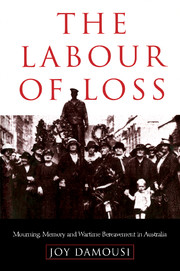Book contents
- Frontmatter
- Contents
- Abbreviations
- Acknowledgements
- Introduction
- Part I The First World War
- 1 Theatres of Grief, Theatres of Loss
- 2 The Sacrificial Mother
- 3 A Father's Loss
- 4 The War Widow and the Cost of Memory
- 5 Returned Limbless Soldiers: Identity through Loss
- Part II The Second World War
- Conclusion
- Notes
- Bibliography
- Index
3 - A Father's Loss
Published online by Cambridge University Press: 06 July 2010
- Frontmatter
- Contents
- Abbreviations
- Acknowledgements
- Introduction
- Part I The First World War
- 1 Theatres of Grief, Theatres of Loss
- 2 The Sacrificial Mother
- 3 A Father's Loss
- 4 The War Widow and the Cost of Memory
- 5 Returned Limbless Soldiers: Identity through Loss
- Part II The Second World War
- Conclusion
- Notes
- Bibliography
- Index
Summary
How shall we … look the bereaved parents in the face and try to soften their grief?
In April 1921, when the volunteer army, the AIF, was demobilised, a father whose son had returned from the war was moved to write of the profound sense of loss he felt at its passing. For this father, the AIF had come to symbolise more than a civilian voluntary army of men, with no military training or experience, who had freely given their lives to nation and empire. The AIF was a pervasive presence in the emotional lives of those who followed its progress. ‘With its fortunes our lives were bound up, with its units our home ties thrilled’, he confessed. The AIF was a benevolent force, ‘a gallant host’, as it carried, he recalled, ‘in its arms the lives of our Sons … Its personality obsessed our thoughts, day and night it was ever with us.’ It shaped the emotions and carried the pain of those parents who waited:
We visualised more or less successfully, its trials, and its trials we felt as only mothers and fathers could feel, the hardships, and the dangers in which our Boys stood. We scanned the casualty lists of the dead, of the wounded, with mingled feelings of hope and of fear. Those were the days of anxiety, of poignant grief, softened today, but in many cases not yet healed for those whose Sons were numbered among the dead.
- Type
- Chapter
- Information
- The Labour of LossMourning, Memory and Wartime Bereavement in Australia, pp. 46 - 64Publisher: Cambridge University PressPrint publication year: 1999

